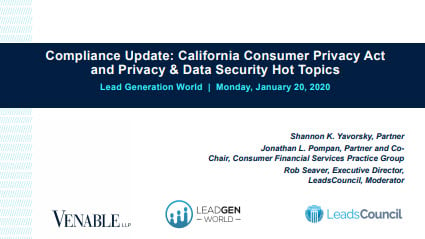Consumer Financial Services Outlook 2020 Webinar
Members of Venable's Consumer Financial Services Practice discussed the current state of federal and state consumer financial protection law and policy, and outlined what you and your company need to know about what's ahead.
Click here to listen to the recording and/or view the slides, which touch on the following topics:
- The CFPB's Future, Congress, and Election Year: What it all means
- CFPB Rulemaking Updates: Debt collection, small dollar loans, and more
- FTC, CFPB, and State Attorney General Enforcement and Litigation Trends, and What's Next
- Forging Ahead with Risk and Compliance Initiatives
- Future of Bank FinTech Partnerships and Chartering
This session focused on providers of consumer financial products and services and their service providers, including nonbanks, banks, and advertisers, in such markets as student loans, mortgage lending and servicing, auto lending, small dollar lending, consumer reporting, consumer credit and related services, money transmission and check cashing, prepaid cards, debt collection, debt relief services, and debt buying.
Adding Fuel to the Fire: Company’s Hidden Fees Sparks FTC Suit
On December 20, 2019, the Federal Trade Commission (FTC) sued FleetCor Technologies, Inc., a fuel card marketer, and Ronald Clark, its CEO, in the Northern District of Georgia. The FTC lawsuit alleges that FleetCor charged customers hundreds of millions of dollars in hidden fees, making its promises about helping customers save on fuel costs false. The Defendants market various payment cards, including fuel cards, to companies in the trucking and commercial fleet industry. While the FTC interprets its authority to cover businesses, as it chose to do here, it does not often do so.
"Compliance Update: California Consumer Privacy Act and Privacy & Data Security Hot Topics" at Lead Generation World
Venable partners Jonathan L. Pompan and Shannon K. Yavorsky participated in the panel "Compliance Update: California Consumer Privacy Act and Privacy & Data Security Hot Topics" at Lead Generation World in Denver on January 20, 2020. They discussed the latest on compliance requirements and best practices for the CCPA, the EU’s General Data Protection Regulation (GDPR), and other federal and state privacy and data security law developments. The interactive Q&A covered the impact, scope, and consequences of sweeping new privacy laws and what lead generators need to know about the evolving legal landscape.
LIBOR Phaseout: NYDFS Now Requires a Plan and Other Regulators Are Watching
LIBOR will be reliably published only until the end of 2021, and financial institutions must transition their existing positions and future offerings to a new benchmark interest rate. The NYDFS is requiring the institutions it supervises to submit LIBOR cessation plans by February 7, 2020. Meanwhile, other financial regulators are encouraging institutions to focus their efforts on planning for the transition, because 23 months is a relatively short period of time to complete what likely will be a complicated process.
Statutory Dreams or Equitable Nightmares: A Trifecta of Cases Before the Supreme Court Threaten the FTC’s Enforcement Authority
The ghost of cases past returns to haunt the FTC’s ability to obtain equitable monetary relief under Section 13(b) of the FTC Act. Three cases now pending Supreme Court review have the potential to significantly threaten the FTC’s enforcement authority: Liu v. SEC; FTC v. AMG Capital Management, LLC; and FTC v. Credit Bureau Center, LLC. Given the unique posture of each case, in perspective with one another, the Court has the opportunity to, at the least, provide guidance, and at most, directly decide, whether Section 13(b) allows for such relief.
New York-Based Companies May Have to Retrieve Documents from Affiliates Abroad
Banks, financial institutions, and other companies in New York should take notice of a recent Second Circuit decision that empowers a district court to compel a New York-based entity to procure documents from foreign affiliates and subsidiaries for document production in federal cases.
